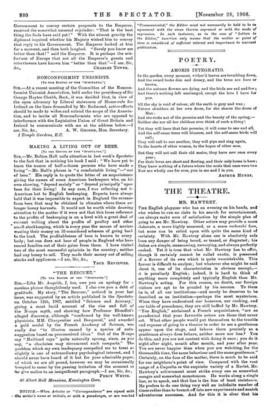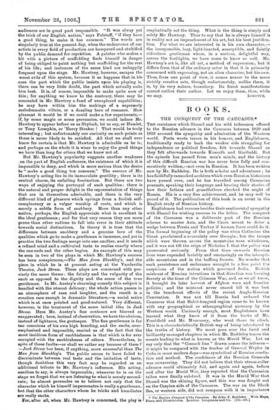THE THEATRE.
MR. MAW TREY.
THE English playgoer who has an evening on his hands, and who wishes to run no risks in his search for entertainment, can always make sure of satisfaction by the simple plan of going to see Mr. Hawtrey. Other actors may provide a more elaborate, a more highly seasoned, or a more recherCh4 fare, but none can be relied upon with quite the same kind of certainty. With Mr. Hawtrey alone one is absolutely safe from any danger of being bored, or teased, or disgusted ; his dishes are simple, unassuming, unvarying, and always perfectly cooked. Yet it is true that what Mr. Hawtrey has to offer, though it certainly cannot be called exotic, is possessed of a flavour of its own which is quite unmistakable. This flavour is difficult to analyse ; but whatever else might be said -about it, one of its characteristics is obvious enough,— It is peculiarly English ; indeed, it is bard to think of anything more completely and typically_English than Mr. Hawtrey's acting. For this, reason, no doubt, our foreign visitors are apt to be puzzled by his success. . To them he is, of all our institutions—and surely be deserves to be described as an institution—perhaps the most mysterious. When they have understood our hansoms, our cooking, and our table of precedence, they are still baffled by Mr. Hawtrey. "You English," exclaimed a French acquaintance, "are so paradoxical that your favourite actors are those that never act. What other people would put themselves to the trouble and expense of going to a theatre in order to see a gentleman appear upon the stage, and behave there precisely as a gentleman always does behave, neither more nor less P Ton do this, and you are not content with doing it once ; you do it night after night, month after month, and year after year. You are never happier than when you are watching, for the thousandth time, the same behaviour and the same gentleman." Certainly, on the face of the matter, there is much to be said for our neighbour's point of view. Compared with the vast range of a Coquelin or the exquisite variety of a Ballet, Mr. Hawtrey's achievement must strike every one as somewhat meagre and somewhat monotonous. He works along a single line, so to speak, and that line is the line of least resistance. He prefers to do one thing very well an indefinite number of times rather than to branch-off into new experiments and snatch adventurous successes. And for this it is clear that his audiences are in great part responsible. "It was alway yet. the trick of our English nation," says Falstaff, " if they have a good thing; to make • it too common." The words are singularly true St the present day, when the endeavours of our artists in every field of production are hampered and stultified by the public demand for repetition. A painter who makes a hit with a picture of scaffolding finds himself in danger of being obliged to paint nothing but scaffolding for the rest of his life; and instances of the same kind are unhappily frequent upon the stage. Mr. Hawtrey, however, escapes the worst evils of this system, because it so happens that in his .case the part which the public insists upon his playing is, there can be very little doubt, the part which actually 'suits him best. It is, of course, impossible to make quite sure of this ; for anything we know to the contrary, there may lie concealed in Mr. Hawtrey a fund of unexplored capabilities; be may have • within him the makings of a supremely melodramatic villain; or a dazzling hero of romance. How pleasant it would be if we could make a few experiments,— if, by some magic or some persuasion, we could induce Mr. Hawtrey to appear before us as Shylock, let us say, or Hamlet, or Tony Lumpkin, or 'Finery Straker ! That would be truly interesting ; but unfortunately our curiosity on such points as these is never likely to be satisfied. All that we shall ever know for certain is that Mr. Hawtrei is admirable as he is; and perhaps on the whole it is wiser to enjoy the good things we have than long for others that we know not of.
But Mr. Hawtrey's popularity suggests another weakness on the part of English audiences, the existence of which it is impossible to deny, and which is more serious than the desire to " make a good thing tco common." The essence of Mr. Hawtrey's acting lies in its immaculate gentility ; there is its central charm, its unfailing fascination. But there are two ways of enjoying the portrayal of such qualities : there is the natural and proper delight in the representation of things that are in themselves admirable, and there is the very different kind of pleasure which springs from a foolish self- complacency or a vulgar worship of caste, and which is merely a subtle form of snobbery. More than any other nation, perhaps, the English appreciate what is excellent in the ideal gentleman ; and for that very reason they are more prone than other nations to fall into error in 'their attitude towards social distinctions. In theory it is true that the difference between snobbery and a genuine love of the qualities which go to make a gentleman is immense, and yet in practice the two feelings merge into oneanother, and it needs a refined mind and a cultivated taste to realise exactly where the one ends and the other begins. An example of this may be seen in two of the plays in which Mr. Hawtrey's success has been conspicuons,—The Man from Blankley's, and the piece in which be is at present acting at the Vaudeville Theatre, Jack Straw. These plays are concerned with pre- cisely the same theme : the fatuity and the vulgarity of the snob as opposed to the dignity and the sense of the true gentleman. In Mr. Anstey's charming comedy this subject is handled with the utmost delicacy; the whole • action passes in an atmosphere of ease and laughter, and the result is a creation rare enough in dramatic literature,—a social satire which is at once pointed and good-natured. Very different, however, is the treatment of the same initial idea in Jack Straw. Here Mr. Anstey's fine contours are blurred or exaggerated ; here, instead of obiervation, we have the obvious, instead of lightness, the grotesque. The fine gentleman is far too conscious of his own high breeding, and the snobs, over- emphasised and impossible, remind us of the fact that the most insidionsform of snobbishness is that which is for ever occupied with the snobbishness of others. Nevertheless, in spite of these faults—or shall we rather say because of them P —Jack Straw has been, if anything, more successful than The Man from Blankley's. The public seems to have failed to discriminate between real taste and the imitation of taste, though doubtless this very fact may be regarded as an additional tribute' to Mr. Hawtrey's influence. His acting, needless to say, is always impeccable; whenever he is on the stage we forget that we are listening to what is merely second- rate; he almost persuades us to believe not only that the character which he himself impersonates is really a gentleman, but that the other characters whom he tricks and humiliates are really snobs.
For, after all, when Mr. Hawtrey is concerned, the play is
emphatically not the thing. What is the thing is simply and solely •Mr:Ha.wtrey. Thus to say that he is always himself is in reality not an impeachment of his art, but his best.justifica, Lion. For what we are interested in is his own character,— the irresponsible, lazy, light-hearted, susceptible, and faintly ridiculous gentleman whom, in a curious, delightful way, across the footlights, we have come to know so well. Mr. Hawtrey's art is, like all art, a method of expression; but it differs from that of the ordinary actor in that it is primarily concerned with expressing, not an alien character, but his own. Thus, from one point of view, it comes nearer to the more strictly creative arts, though unfortunately, unlike them, it is, by its very nature, transitory. Its finest manifestations cannot outlive their author. Let us enjoy them, then, while



















































 Previous page
Previous page